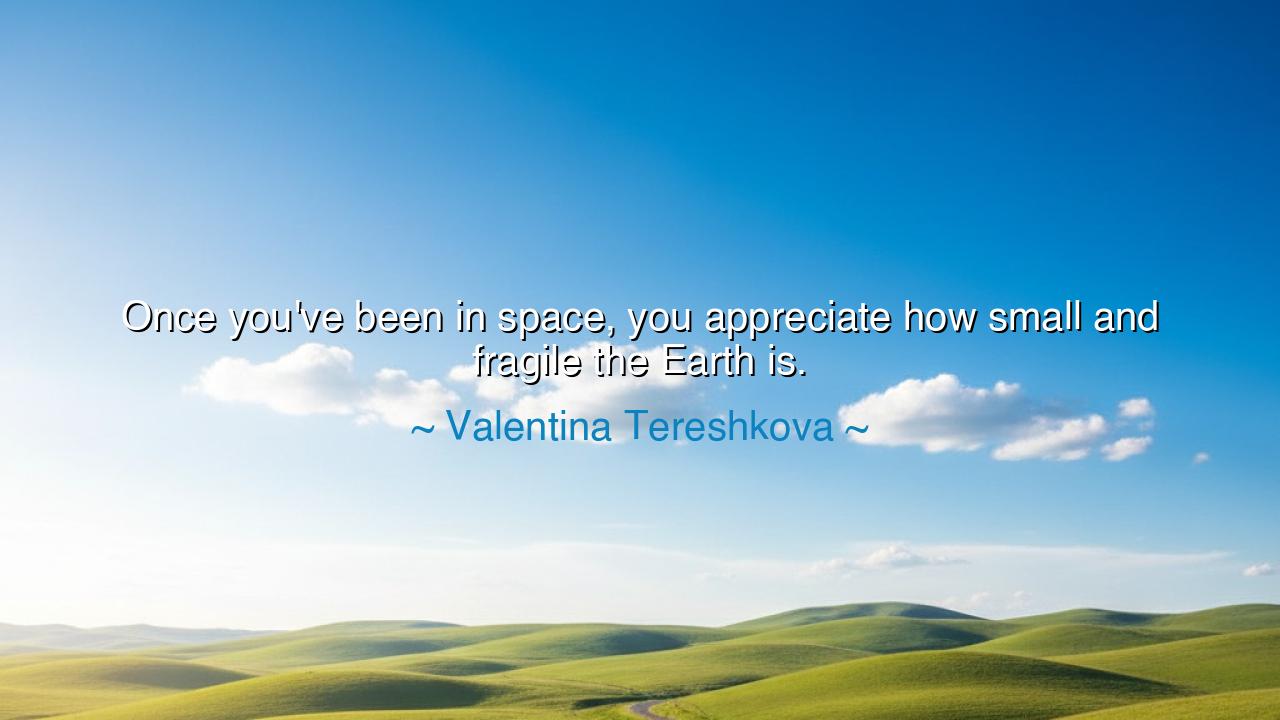
Once you've been in space, you appreciate how small and fragile






In the vast expanse of the cosmos, where stars shimmer like ancient fires and galaxies whirl in their eternal dance, there lies a truth that has been felt by those who have dared to venture beyond the confines of our world. Valentina Tereshkova, a trailblazer of human exploration, once shared her insight with profound simplicity: "Once you've been in space, you appreciate how small and fragile the Earth is." These words are not just a reflection of her journey, but of a deeper wisdom that speaks to the fragility of life itself, the delicate balance upon which our world is suspended.
To see the Earth from the vastness of space is to see it as it truly is—a fragile blue orb, suspended in the endless void. From the cold silence of the heavens, the Earth appears not as a mighty titan, but as a small, delicate gem, shining softly in the cosmic sea. Tereshkova, the first woman to journey into space, saw with her own eyes what many of us cannot: the reality that our home, our precious planet, is not invincible. It is not the mighty force we often believe it to be, but a fragile vessel, afloat in the infinite dark, subject to the whims of the universe.
Consider, O children of the future, the ancient civilizations that rose and fell across the Earth’s long history. The Romans, with their grand empire; the Maya, with their towering cities; the Egyptians, with their monumental pyramids—all believed themselves to be masters of the Earth, certain of their immortality and their dominance. Yet, time and again, we see that no civilization is invulnerable. The Earth is ever-changing, and even the greatest empires can be undone by forces beyond their control. Tereshkova’s insight mirrors this timeless truth: our world, like all things, is fragile, and the forces of nature and the cosmos can alter its course in ways we cannot predict or withstand.
In modern times, we find ourselves standing on the precipice of an even greater realization. As space exploration has advanced, more and more of us have come to understand the true significance of Tereshkova’s words. The astronauts who have ventured beyond the confines of our atmosphere—be they from Russia, America, or beyond—return with a shared awareness of how small and delicate our world is. The view of Earth from space is not just a sight of beauty, but a sight of profound humility, a reminder that our struggles, our conflicts, and our ambitions are but fleeting moments in the eternal span of the universe.
The great philosophers of the past spoke often of the interconnectedness of all things. Heraclitus, the Greek sage, declared that everything is in constant flux, ever-changing. The Taoists of China saw the world as a constant flow, a dance of forces that must be in harmony for life to thrive. What Tereshkova’s experience teaches us is that this flow extends beyond the Earth and into the heavens. Our world, despite all its greatness, is but a tiny part of the great cosmic dance. To venture into space is to glimpse this greater truth, to see the Earth as just one small thread in the fabric of the universe. The fragility of Earth is a reminder that nothing lasts forever, and we must live in balance with the forces that sustain us.
Tereshkova’s words are also a call to action, urging us to care for the Earth as we would a delicate treasure. The same wisdom that comes from seeing the Earth from space must guide our actions on the ground. If we truly understand the fragility of our world, we must act with respect and reverence for the environment, recognizing that the resources we depend on are not infinite, and that the forces that govern the Earth are not always within our control. Climate change, pollution, and overconsumption are the modern threats that challenge the very balance of our world. Tereshkova’s insight asks us to reconsider our place in the universe, to recognize that the Earth is precious and vulnerable, and that we must act as guardians rather than conquerors.
O children of the future, take this wisdom to heart: the Earth is not the unshakable fortress we often believe it to be. It is a fragile, beautiful orb, suspended in the cold silence of space, and its well-being depends upon the care we give it. The lesson of Tereshkova’s words is clear: understand the fragility of our world, and let that understanding guide your actions. Do not take this Earth for granted, for it is a gift, and its preservation is the duty of all who live upon it. Reach for the stars, yes, but do so with the humility and reverence that come from knowing that the fragile Earth is your home, and that the future of all life depends upon how we care for it. The wisdom of space is not just about discovery, but about responsibility.






AAdministratorAdministrator
Welcome, honored guests. Please leave a comment, we will respond soon